Years ago when I first started writing, I had an audience of one. As I finished every poem, personal essay, or assigned paper, I dialed my dad to read it aloud. He always picked up the phone. I knew I was calling him at work. I might have interrupted him when he was seeing a patient, or later when he was sitting behind the CEO’s desk at Wheeling Hospital, but he always took my call. He didn’t just answer. He made the time to listen to me read. I know I could have just read it aloud to myself. Walking around the room while reading to an imaginary audience, my ears might have caught what my eyes missed. It was different when I read it to my dad. Awkward phrasing, repetitive words, and convoluted sentences suddenly became obvious and unacceptable. Dad’s request for me to “repeat that last paragraph” would always reveal a confusing tangle of ideas ripe for an edit.
Reading to my dad forced me to slow down. Each word must be processed and pronounced, creating a more thorough examination of my work and revealing its natural rhythm and flow. Good writing has a cadence that feels right when spoken. My voice was my most powerful editing tool and my father my most ardent audience. I highly recommend it.
My writing and I were a little lost after Dad died… until I started writing these walks and reading them to Rick Paolina.
I am blessed that he wants to hear each one. I guess you could say he gets the audio version before anyone else does. While he is easily moved to emotion, he tends to be brought to tears by the transcription of these walks. “It gets windy” as he puts it. If he doesn’t chuckle and cry, the piece isn’t ready yet. The thing we could all learn from him is that he doesn’t just hear me, he listens. He stops everything he is doing. He sits down and listens. He gives me his undivided attention. Sometimes he asks questions for clarity. Sometimes he asks, how can I help that person or that situation?
If you know Rick, you know how big his heart is. He has more stories of coaching a young man, helping a stranger or making someone’s day than you can imagine. One day a friend of his son’s stopped us. Now an adult, he said “Look Coach Paolina, my shoes are tied.” They laughed, shook hands and caught up on the years that had passed since Rick influenced his life as a soccer coach, who insisted on taking care of the details like a well-tied shoe. Just yesterday, he jumped out of the car as if ejected when he saw an elderly man stumble in the parking lot. He calmed him, made sure there was help and then directed parking traffic. When Luke produces the audio for this walk, he will hear more tangential greetings of “Hi. How is your day going?” than on any other walk. No matter how that passerby acknowledges him, Rick responds, “Just fine, thanks” as if everyone asks in return – expecting the best from others no matter what. Rick Paolina knows that this life is made up of the little moments, small gestures, and genuine kindnesses. If you ask him about it, he will shrug and tell you that he might be the only person who smiles or says a kind word to someone each day. He takes that responsibility seriously. If not him, who?
Rick: I’ve been in a few situations where I’ve said to myself that, jeez, I may be the only person this individual talks to today.
Liz: Can you remember a specific instance of that? Because you do say that to me a lot.
Rick: Yeah. The one that comes to my mind that I usually end up getting choked up a little bit about is when I volunteered with Bruno at Catholic Charities for Thanksgiving one year. In addition to serving the community at their establishment, they also deliver meals on wheels every day, seven days a week. Somehow, something got mixed up in one route that people didn’t show up. There were folks who were not going to get their food unless they could figure out a backup plan. We decided that we would take the meals and deliver them to those folks. I don’t know, we had probably 40 or 50 meals. A lot of them went to housing developments. Then we pulled to a really nice house. I took the meal, went up, knocked on the door, and this beautiful lady came to the door dressed like she was going to a ball.
She had her makeup on and her hair was done. She opened the door and I said, “Hi, I have your Thanksgiving meal.” She goes, “Oh, man, I’ve never seen you before.” I said, “No, there was a mix-up and we’re new.” She couldn’t thank me enough. I said, “You have no idea how much it means to me to be able to do this for you.” I got in the car and I was teared up. Bruno asked me what was wrong, and I said, “That lady, I don’t know what her situation is, but she could not have been kinder. I just feel like I may be the only person that she sees today or talks to today.” And probably that’s my most memorable experience with that.
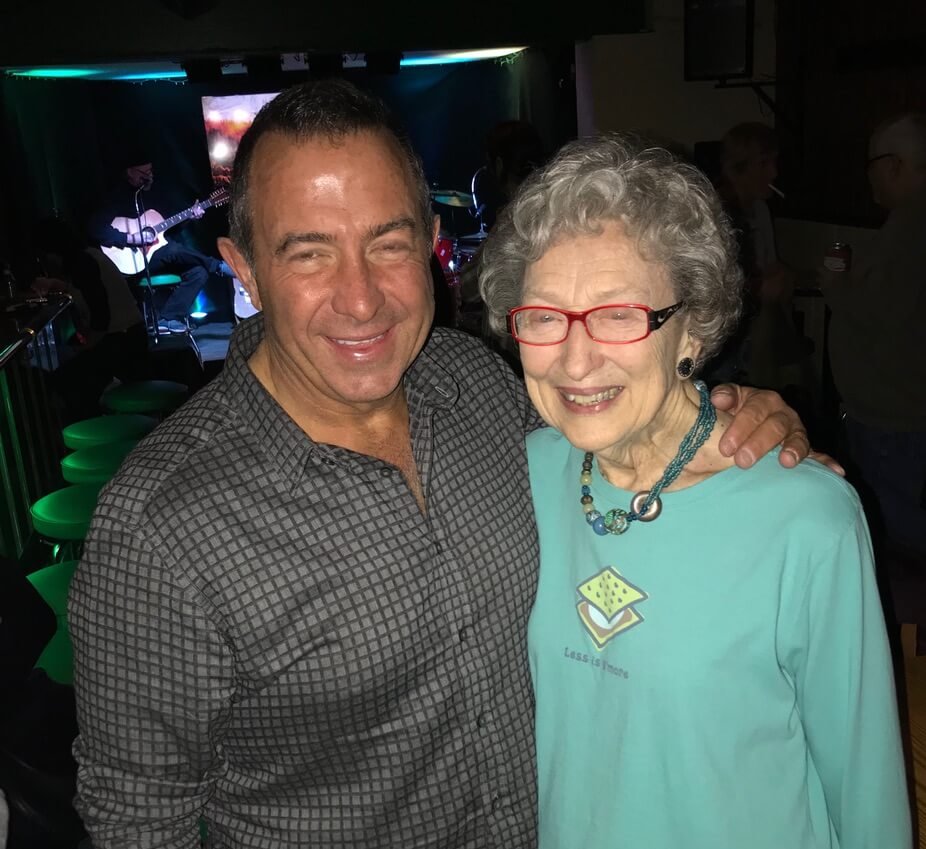
That story always reminds me of my mother. When she could no longer go out as easily as she once did, she welcomed the plumber, HVAC engineer or food delivery person well dressed and with open arms. She would text me and tell me about how nice the young man or woman was. She would also share some part of their life story as if she had had a visitor over for tea. I can just picture her sitting there, perfectly dressed for the cable guy, making him feel like the most important person of the day. I know he left there a little happier than when he arrived. She was always like that. While in practice with my father, my mom would barely see half of the patients in a day that my dad would. He paid attention to their symptoms and respected their schedules and his. She asked a myriad of questions and paid attention to all the details of a life, respecting their heart and spirit as well as her own. She practiced medicine with her whole heart, seeing each patient as a complete person with a story worth knowing. The healing probably started the moment they sat down with her.
It is no wonder that my mom’s summary judgement on Rick was simply, “Now that’s a good man.”
When I said, “That story always reminds me of my mother” it also tells you that I hear Rick’s stories more than once – all of them – with the exception of a few, I am sure. I never tire of them. Not just because they are good tales, but because you can hear his heart in the lilt of his voice. He doesn’t take credit for his own generous spirit. He is grateful to his family for that.
Rick: I’ve been fortunate to live the life that I’ve had, most of it due to my grandparents, my mom, and my brother and sister and I. But we were given an opportunity and I always feel like giving back, being kind is just a little small gesture to say thanks to people, even people you don’t know. Again, you never know what the other person’s circumstance is, and I just always like to feel like they deserve a touch of kindness.
Rick: I’m trying to do the right things, especially when it comes to the people around me. I’m trying to treat people the way I want to be treated. If there’s something that they have going that ‘s causing them to look differently on me, then that’s their issue or problem.
Liz: That’s damn healthy.
Rick: Yeah, it’s a little tougher to do from time to time, but again, at the end of the day I really do try to live every day and treat people kindly, try to make them feel a little better than maybe before they met me or saw me or talked to me. If I can do that, treat the people around me that I love and care about, you being the top of that list, all four of my sons, I’m going to sleep well at night.
Very much like Theresa Kowcheck, whom you met earlier, Rick Paolina never met a stranger. They can chat with anyone, anywhere, as if they’ve known them forever. There’s something magical about these two. They carry a spirit that transforms awkward Uber rides into meaningful connections and turns checkout lines into opportunities for genuine human contact.
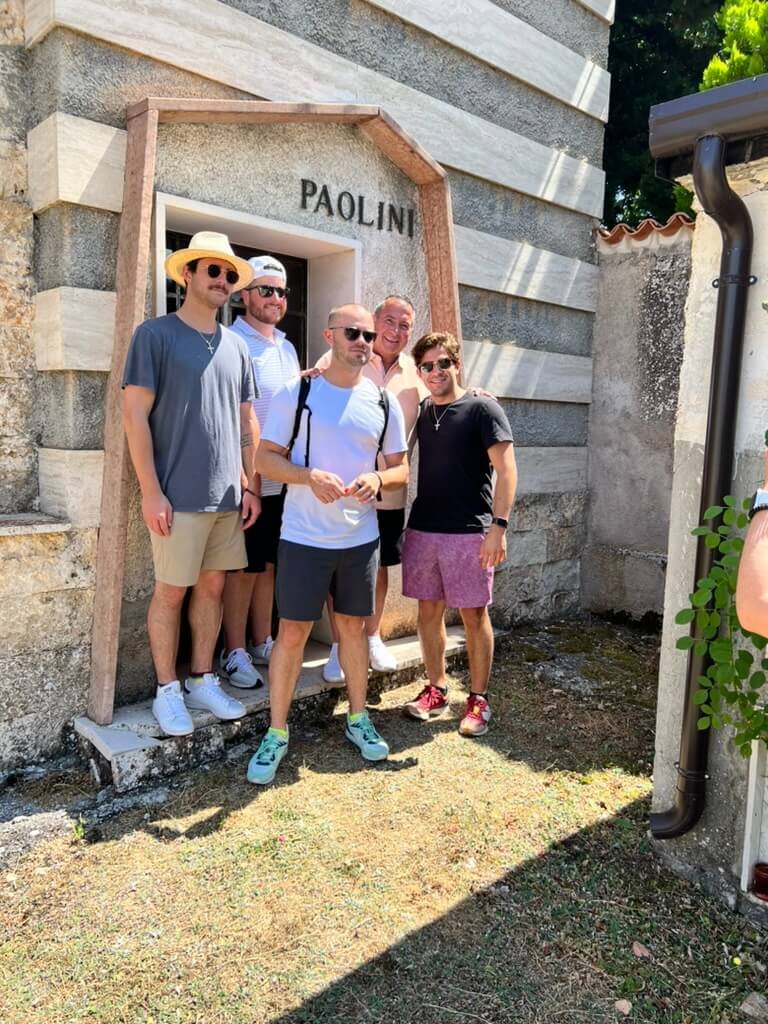
What’s their secret? I’m not sure, but I believe it’s a combination of authentic curiosity, the absence of judgment, and a fundamental belief that everyone has something valuable to share. Every story matters.
Also like her, he has an army he is fighting in his mind at times. There is a voice that undermines his very nature. He refers to his army as the Big Fat Liar.
Rick: The Big Fat Liar. I’ve had a lot of mental and emotional challenges throughout my years. Some were brought on my own. Some of them were a little bit deeper than that. A lot of the things that I feel I struggle with comes from the fact that I didn’t have a dad. My grandfather stepped in taking that place a little bit. Dad left when I was five and never tried to contact us as far as I know. I think I’ve had some abandonment issues that are buried deep down inside.
That said …a lot of the things that I think about my appearance, being overweight, maybe thinking people are judging me or whatever, it is comes from a place in my brain that I had a therapist call the Big Fat Liar.
I don’t know. The Big Fat Liar is a big problem for me because I let these negative thoughts, whether it’s about my dad or about maybe things that I’m doing in my life that I wish I could change, start to snowball. So I’m trying to do better with that.
That critical inner voice that whispers (or sometimes shouts) that we’re frauds, that we don’t belong, that it’s only a matter of time before everyone figures out we don’t deserve to be where we are. The imposter syndrome seems better identified with the more visceral label: The Big Fat Liar. The real danger, as Rick points out, is how quickly these thoughts compound. One negative thought leads to another. Soon, a single mistake becomes evidence of your entire unworthiness. A moment of uncertainty spirals into questioning every decision you’ve ever made. Who among us hasn’t been there?
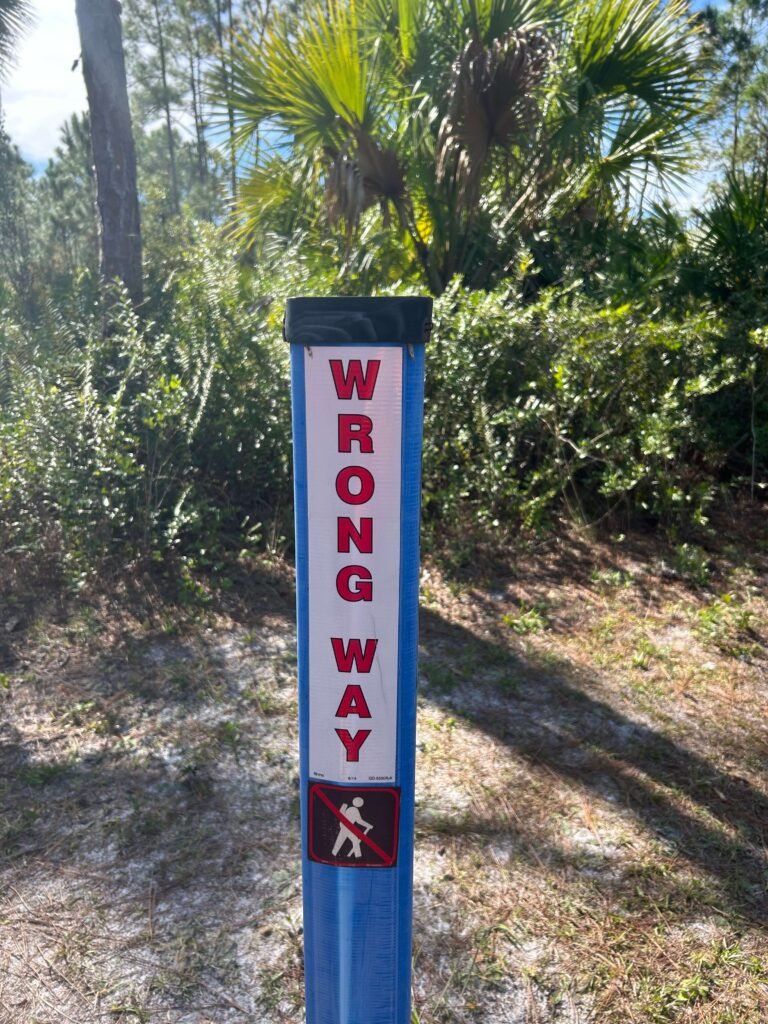
The very fact that you worry about not being good enough suggests you care deeply about your impact, your contribution, and your relationships – precisely the qualities that make a person like Rick authentic and worthy. Its universality doesn’t change the weight or the velocity of the snowball once it starts to form.
Before it becomes an avalanche, mindfulness teacher Tara Brach offers a powerful framework called RAIN that can help us accept our negative emotions.
- R – Recognize what’s happening. Simply notice when the “Big Fat Liar” has arrived. “Ah, there’s that feeling of being not enough again.”
- A – Allow the experience to be there. Instead of immediately pushing away the uncomfortable feelings, give them permission to exist. This doesn’t mean you agree with them—just that you’re creating space to see them more clearly.
- I – Investigate them with kindness. Be curious but give yourself grace. What emotion is this? Did something really happen? What is the story I’m telling myself about what’s happening?
- N – Nurture with self-compassion. Offer yourself the understanding, kindness, and reassurance you would give a dear friend or a child struggling with these same feelings. You could simply put your hand on your own heart or whisper, “It’s OK” aloud.
The final step, though not part of the acronym, is to Notice that you are not your thoughts or feelings. You are so much more than this temporary experience of inadequacy. You also share this emotion with all of humanity. As Rick concludes in his reflection, “I’m trying to do better with that.” Aren’t we all? And maybe that continuous effort to grow, to improve, to become more authentic and compassionate – even toward ourselves, especially toward ourselves – is exactly what makes us genuinely “enough” after all.
After 53 years in his family-owned beer distributorship, Rick has some hard-earned wisdom about life, hard work and the way we treat each other.
Rick: I started working when I was probably 10. My grandfather had my brother and I sweeping floors, mopping floors and cleaning toilets. Jesus, we did everything that you could possibly imagine. But then you work through the next 10, 15, 20 years, and now you’re out selling, and then you’re in management and you’re going to meetings.
Liz: But you don’t forget what it’s like to push a broom.
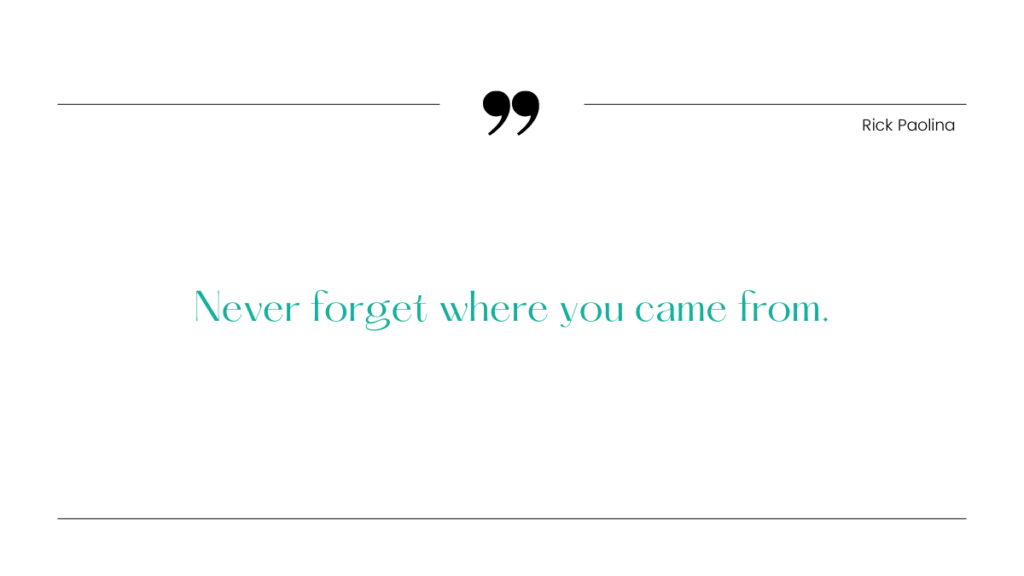
Rick often says, “Never forget where you came from.” For him, home is Bellaire, Ohio, but the expression means more about humility than geography. Rick urges others to stay grounded, be grateful and to lead with kindness. Never think you are more than someone else.
Rick: I used to be in my office back at Muxie’s, and somebody would come in and they’d just start like, Hey, did you know that… I’m like, Hold on a second. Take a minute. Take a breath. Good morning. How are you doing? How’s your day going? For me, it worked in a lot of good ways, whether it was dealing with customers or if it was dealing with my kids or just people in general. Again, be kind, be aware of who you’re working with and who you’re talking to. I think it slows things down. Be a good listener.
Liz: Well, it’s supposed to all come back around, right? Isn’t that what my whole project is turning out to be that it’s actually pretty simple. We make it so complicated, but it’s pretty simple.
In our hyper-connected world where everyone’s talking, posting, and sharing opinions, the simple act of listening has become something of a lost art. Real listening happens when we quiet our inner voice, so it has the value of silencing The Big Fat Liar too. The irony is that listening requires nothing but our attention—no special skills, no training, no equipment. And I have found time and again that true listening leaves both parties feeling better than we did at the start.
Rick sits down across from me and lets me read these blogs aloud. If we are a thousand miles apart, he sets the phone in front of him, grabs his signature rolled-up paper towel in case “it gets windy” and listens. One couldn’t ask for more in this world. It’s that simple.
Liz: Thanks for walking with me. Wasn’t as bad as you expected, was it?
Rick: No, it was not. I’m very proud of you and what you’re doing. I’m just lucky that I’m along with you for the ride…the walk.



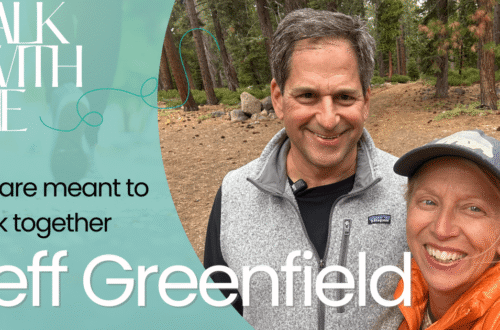
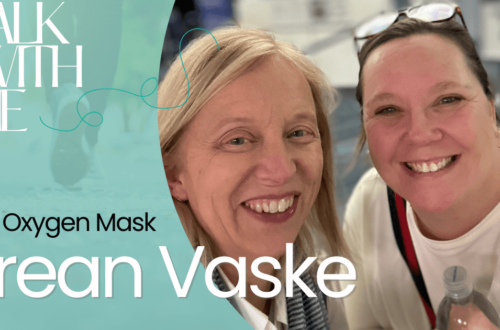
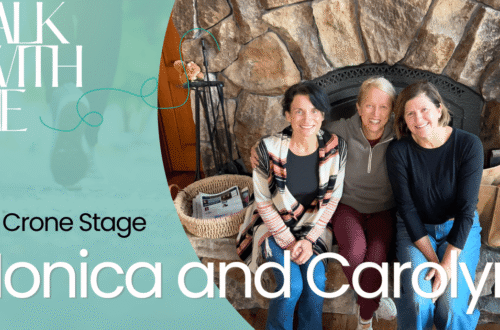
Love this about Rick. Love seeing the pic of your mom. My mom, Barbara , went to Ocean City with her many times. They enjoyed the laughter and tears!!!